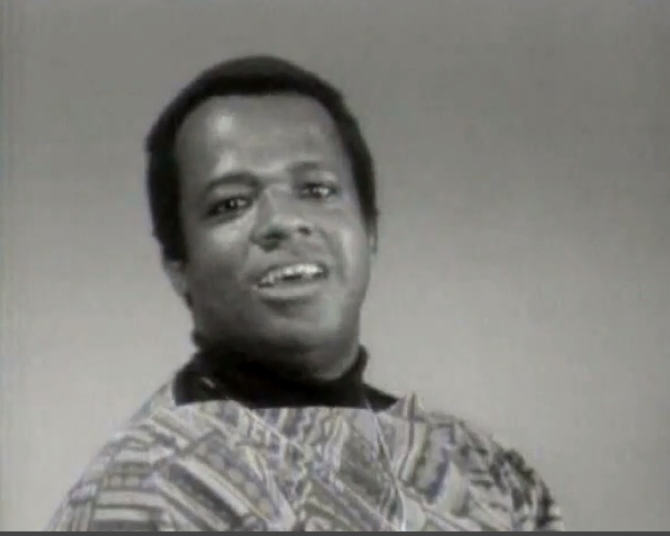
When I was growing up in a northern-New Jersey ghetto in the early Afro-picked 1970s, my mom used to take me places in her car. Our radio dial was locked to 1430 WNJR, a soul AM station, and in the afternoons I would hear something at the top of the hour called “National Black Network News.” National black newscasters were talking about the condition of black people.
We don’t hear enough of that anymore.
I was reminded of that when I heard that William Greaves had passed away on Aug. 25 at the age of 87. Nearly 50 years ago, Greaves was fighting a war in the media world and we were all the beneficiaries. The skirmishes were over black public-affairs television programs—shows that presented undiluted African-American political, social and cultural views on white television during the height of the civil rights movement and black power eras. Greaves was a pioneer of one: Black Journal.
In 1968, more than 100 cities had caught aflame after Martin Luther King Jr.’s assassination. The Kerner Commission Report had just been released, and its media chapter explained that the virtually all-white news media were complicit in making black people invisible. Across the nation, virtually all of major-market television responded–local and national, commercial and public—with black public-affairs television shows—programs that would reflect the black experience.
Black Journal was produced by and for the National Educational Television network (now PBS). Greaves was the co-host, but he and the black staff had to walk off the show to make sure it was run by a black executive producer.
Film Quarterly wrote about the incident: “After the third program had been aired, certain contradictions within the production of Black Journal had crystallized. Although the series was being sold as ‘by, for and of the black community,’ the white [Alvin H.] Perlmutter was firmly in charge, and the programming was often dominated by white-produced segments. In mid-August, there was a palace revolt. Eleven of the 12 black staff members resigned in protest.” A compromise was made: Greaves would produce, Perlmutter was renamed a “consultant” and the show got more black staffers.
The first Black Journal programs show how clear, and how confused, black America was in 1968. With King’s blood still wet on the Memphis, Tenn., motel balcony, in which direction would black people (note: not black Americans) go? Were they about to build a new, black nation; change the existing one; or both? That was the power of Black Journal and all the shows like it, across the nation.
Devorah Heitner, author of Black Power TV, a major study of black public-affairs television programming in New York and Boston, said in an email interview: “What I remember most is Greaves’ colleagues telling me that he understood how much Black Journal was a product of its moment, and supporting/advising them to be as critical and as brilliant and brave [as they were]—he understood that the space to tell these stories could disappear at any time! This loss is profound, but Greaves’ legacy of creative work and mentorship will be felt for a long time.”
Greaves was right about the shifting sands.
At surface glance, that space seems to have expanded exponentially in the 900-channel age of Obama. News- and public-affairs-hungry black audiences have Roland Martin and Al Sharpton on radio and cable television every weekday, Melissa Harris-Perry on the weekend, and Tavis Smiley on PBS and public radio (and a new show or two, regionally), and black anchors dominate America’s largest television markets. (Black America even has “black Twitter” clearly surpassing the black talk, AM-radio call-in bluster, but that’s another article for another time.)
What is missing, however, is not the visibility and reach but the tone—the constant, directed anger against a white supremacist, capitalistic system; the sociohistorical perspective; and the intended audience of black people hungry for political and cultural nourishment on unapologetic black terms.
Most of those black public-affairs shows created from the Kerner Commission and King’s death are gone from the local television markets. Our serious and most controversial aspects of black history, therefore, are fading from black America’s collective memory and editorial control, replaced by occasional segments on the white newsmagazine Democracy Now!, black history feel-good tidbits and blanket coverage of sporadic community flare-ups when a black child is shot by a white police officer.
Jennifer McArthur, a protégé of Greaves, might agree. “A group of us at LinkTV tried to develop a newsmagazine in a similar vein to Black Journal,” she said in an email interview. “This was right after Katrina, and the idea was to anchor the program in black New Orleans. We thought it could be a real success; after all, Americans had been glued to the TV 24-7, watching the news out of New Orleans. Yet even with Danny Glover attached, we weren’t able to raise enough money to produce the show. Investors didn’t think ‘mainstream’ audiences would find it of interest. From that experience, it became clear to me just how radical Black Journal was for not only the ’60s but the present day.”
William Greaves is an ancestor now, as is Gil Noble, another pioneer. The show that replaced Black Journal—Tony Brown’s Journal—is also gone (but Tony Brown, thankfully, is still alive). The folks who took the street-corner-orator perspective off the corner and onto the boob tube are more and more becoming like their shows. In their stead stand a lot of activist Web radio/video on one side and some well-meaning, but corporate, black people on the other side, some in the latter group afraid, some not. Only a smattering of Web video clips serve to remind us how, once upon a time, to be black and televised was to be at the center of a dangerous, fluid, cultural-political idea—one against the status quo, not just a visual and popular cultural identity lived within it.
Todd Steven Burroughs, an independent researcher and writer based in Hyattsville, Md., is the author of Son-Shine on Cracked Sidewalks, an audiobook on Amiri Baraka and Ras Baraka through the eyes of the 2014 Newark, N.J., mayoral campaign. He is the co-editor, along with Jared Ball, of A Lie of Reinvention: Correcting Manning Marable’s Malcolm X and the co-author, with Herb Boyd, of Civil Rights: Yesterday & Today.
Like The Root on Facebook. Follow us on Twitter.















